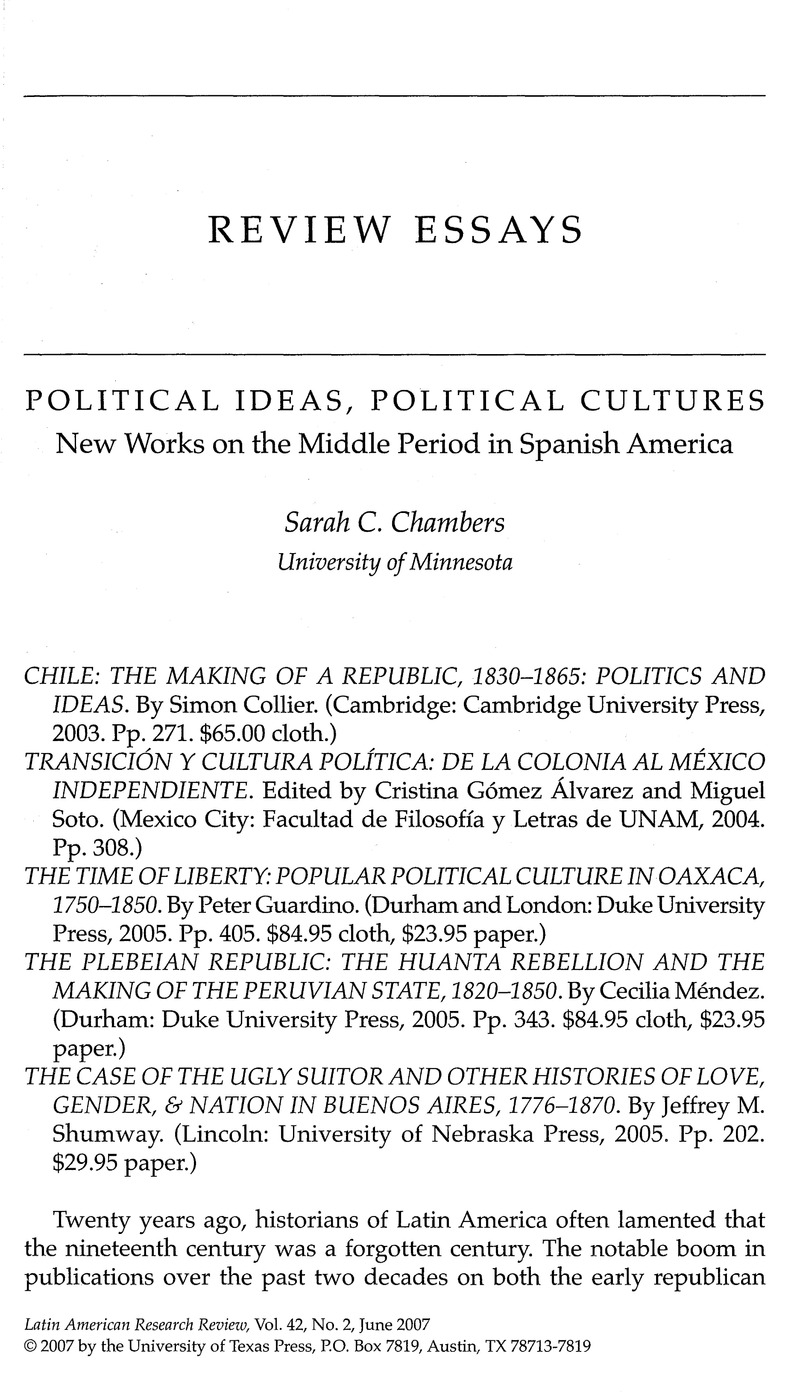No CrossRef data available.
Article contents
Political Ideas, Political Cultures: New Works on the Middle Period in Spanish America
Review products
Published online by Cambridge University Press: 05 September 2022
Abstract

- Type
- Review Essays
- Information
- Copyright
- Copyright © 2007 by the University of Texas Press
References
1. For a recent debate on the concept of political culture among Nils Jacobsen and Cristóbal Aljovín de Losada, on one side, and Alan Knight, on the other, see Jacobsen and Aljovín, Political Cultures in the Andes, 1750–1950 (Durham: Duke University Press, 2005), 1–68. For a synthesis of recent work on popular participation, see Sarah C. Chambers, “New Nations, New Citizens: Political Culture in Nineteenth-Century Mexico, Peru and Argentina,” in Thomas H. Holloway, ed., Blackwell Companion to Latin American History (Boston: Blackwell, forthcoming).
2. François-Xavier Guerra, Modernidad e independencias: Ensayos sobre las revoluciones hispánicas (Mexico City: Fondo de Cultura Económica, 1999). For a sampling of other scholars who take up Guerra's thesis, see essays by Antonio Annino, Mónica Quijada, Annick Lempérière, Marie-Danielle Demélas, and Andrés Lira in Annino and Guerra, eds., Inventando la nación: Iberoamérica, Siglo XIX (Mexico City: Fondo de Cultura Económica, 2003); and Erika Pani and Alicia Salmerón, eds., Conceptualizar lo que se ve François-Xavier Guerra historiador: homenaje (Mexico City: Instituto Mora, 2004). Guerra's work is also cited by many of the contributors to Transición y cultura política.
3. Peter Guardino, Peasants, Politics, and the Formation of Mexico's National State. (Stanford: Stanford University Press, 1996).
4. The first position is argued by Eric Van Young, The Other Rebellion: Popular and Ideology in Mexico, 1810–1816 (Stanford: Stanford University Press, 2001); the latter by Florencia E. Mallon, Peasant and Nation: The Making of Postcolonial Mexico and Peru (Berkeley: University of California Press, 1995); and Guy Thomson and David G. LaFrance, Patriotism, Politics, and Popular Liberalism in Nineteenth-Century Mexico: Juan Francisco Lucas and the Puebla Sierra (Wilmington, DE: Scholarly Resources, 1999).
5. Nelson Manrique, “Campesinado, Guerra y conciencia nacional,” Revista Andina 4 (1) (1986): 161–72; Mallon, Peasant and Nation; Mark Thurner, From Two Republics to One Divided (Durham: Duke University Press, 1997); and Charles Walker, Smoldering Ashes: Cuzco and the Creation of Republican Peru, 1780–1840 (Durham: Duke University Press, 1999).
6. Silva M. Arrom, The Women of Mexico City (Stanford: Stanford University Press, 1985); Elizabeth Dore and Maxine Molyneux, eds. Hidden Histories of Gender and the State in Latin America (Durham: Duke University Press, 2000); Christine Hünefeldt, Liberalism in the Bedroom: Quarreling Spouses in Nineteenth-Century Lima (University Park: Pennsylvania State University Press, 2000); Arlene J. Díaz, Female Citizens, Patriarchs, and the Law in Venezuela, 1786–1904 (Lincoln: University of Nebraska Press, 2004); and Sueann Caulfield, Sarah Chambers, and Lara Putnam, eds., Honor, Status, and the Law in Modern Latin American History (Durham: Duke University Press, 2005).


